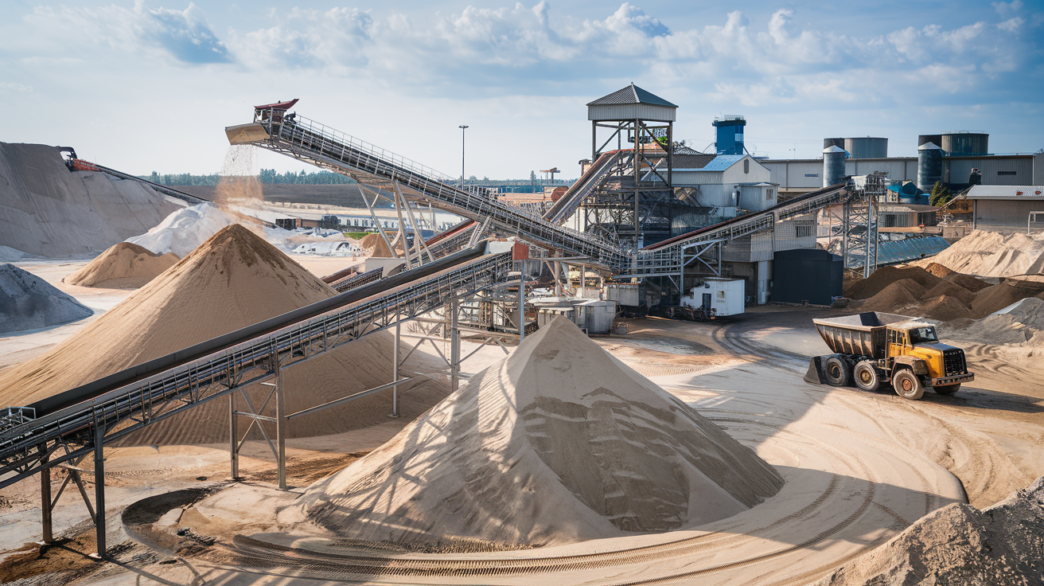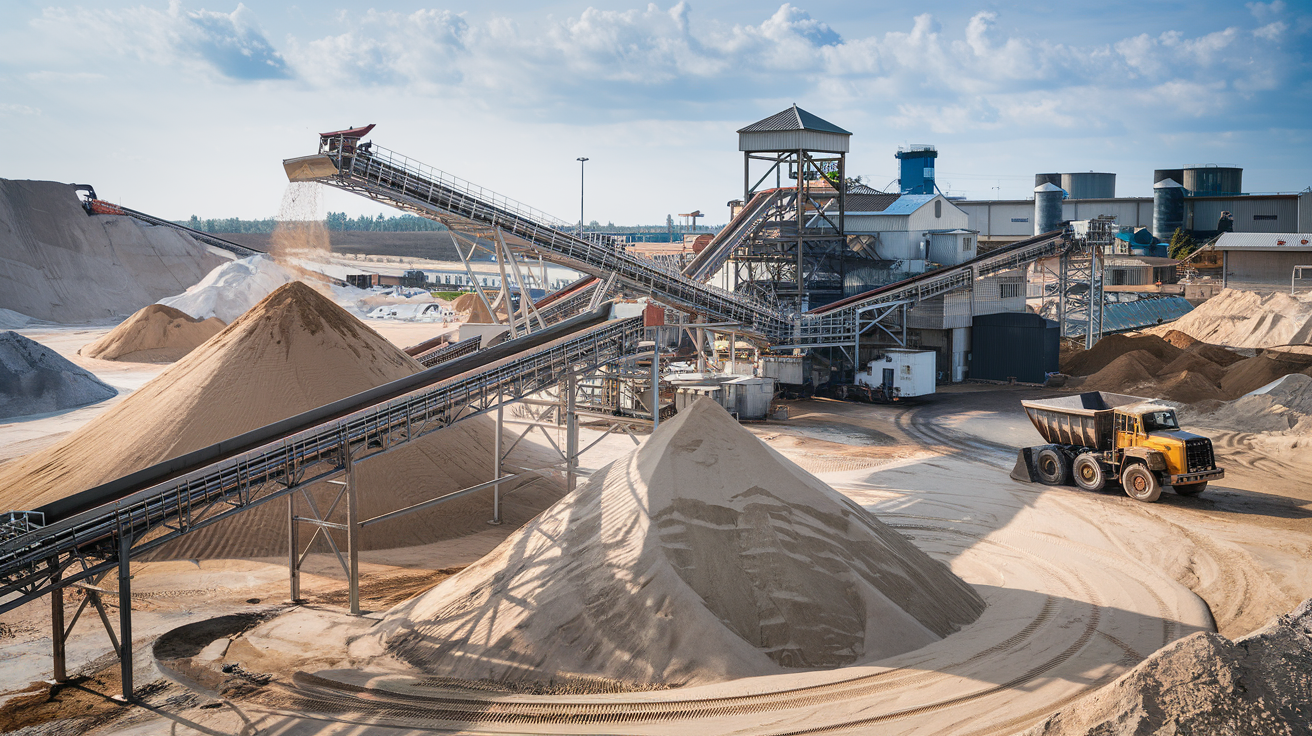Table of Contents Show
Silica? An overlooked investment opportunity with few quality publicly traded companies in the space.
But what is it used for….
What you need to know:
- The EU declared Silicon a critical raw material as a wide range of modern technologies depend on it to make various industrial and consumer products.
- Silicon was added to US Department of Energy (DOE) List of Critical Materials for Energy list in 2023.
- Silicon metal was added to the Canadian critical minerals list in 2024.
- The global silica market size was valued at USD 49.12 billion in 2022 and is estimated to grow at a compound annual growth rate (CAGR) of 9.9% from 2023 to 2030.
In this report on the vibrant and rapidly expanding global silica market, we will delve into the factors driving its growth, the challenges faced by the sector, where we see it going over the next decade, as well as the players you should keep your eye on and why silica is an investment opportunity you shouldn’t miss.

What is Silica?
Silica (SiO₂), or silicon dioxide, is a chemical compound consisting of silicon and oxygen, commonly found in over 95% of rocks. It exists in forms like quartz, cristobalite, and tridymite, and appears as a transparent to gray, odorless powder.
With a high melting point of 3110°F and boiling point of 4046°F, silica is insoluble in water but dissolves in substances like hydrogen fluoride. It is widely used in products such as cement, concrete, ceramics, glass, personal care items, and automotive components, serving roles as a filler, absorbent, abrasive, and more.
These basic use cases are only part of what makes silica special. Silica is an oxide of silicon (silicon dioxide), primarily found in quartzite in white sand or industrial sand. Silicon metal, derived from high quality quartz containing between 96% and 99.99% silicon, is highly stable and doesn’t break easily under high temperatures, making it perfect for semiconductors, microchips and solar panels.
The Importance of Solar
“Solar PV accounted for 4.5% of total global electricity generation, and it remains the third largest renewable electricity technology behind hydropower and wind.” – International Energy Agency (IEA), Renewables: Solar PV
There is roughly 15 kilograms of silicon in a 1 KW solar panel. We currently produce approximately 500 GW of electrical energy through solar panels. This roughly equates to 7.5 million tonnes of silicon.
Experts at the IEA expect there will be five terawatts of solar generated electricity by 2030 resulting in a silicon demand of approximately 75 million tonnes of silicon. This represents a 1,000% demand increase in solar alone.
Silicon and the AI Revolution
A DGX H100 AI server that contains 8 H100 NVIDIA GPUs, contains approximately 1.5 kilograms of silicon. DGX systems are used widely by major cloud providers such as AWS, Google Cloud, Microsoft Azure and Oracle for AI workloads. As such, there are several thousand currently in operation in a global AI market worth approximately $214.6 billion.
Industry analysts estimate the AI sector will balloon to $1.8 trillion USD at a CAGR of 36.6% by 2030. While it is hard to predict an exact figure of DGX H100 servers expected to be deployed by 2030, considering the current growth trajectory, it is reasonable to assume that number will be in the tens of thousands. That’s a 30-40% silicon demand increase.
Energy Storage and Other Tech
What’s even more exciting is silicon’s long held promise in the rapidly growing power storage market. Graphite is the traditional primary anode material for lithium-ion batteries, but silicon has shown the potential to hold 10 times as many lithium ions by weight as graphite and major EV manufacturers like Porsche, Mercedes and GM are already throwing in on developing the silicon anode technology.
From energy storage to data storage, Microsoft is developing a novel new non-volatile solution that could replace our current magnetic-based chips with silica-based glass plates that are resistant to electromagnetic pulses and able safely store several terabytes of data for thousands of years on a plate the size of a drink coaster.
It’s Critical
China is currently the world’s largest producer of low-cost silicon. Even though this has contributed to both the affordability and scalability of solar PV, it has also led to heightened competition for resources with China. This competition has affected domestic U.S.-based silicon solar cell manufacturers where domestic supply is limited.
To illustrate this silicon production imbalance, according to the USGS, the United States had an estimated 310,000 metric tons of silicon mine production in 2022. By comparison, China had an estimated 6 million metric tons of annual silicon production in 2022. This presents a huge problem as trade relationships between China and the West are becoming even more fractured.
As such, the United States has recognized silicon as a critical material, particularly in the context of its role in semiconductor manufacturing and the growing demand for energy transition technologies like batteries. In 2024, the U.S. emphasized the importance of securing the supply chain for critical minerals, including silicon, through initiatives such as Executive Order 14017, aimed at reducing reliance on foreign sources and bolstering domestic production.
Following suit, both Canada and the European Union have also recognized silicon as a critical material, updating their Critical Minerals Lists, and formalizing their cooperation through the Canada-EU Strategic Partnership on Raw Materials, which focuses on enhancing the resilience and sustainability of critical mineral value chains.
Securing the Silica Supply Chain
Even though quartz deposits are a dime a dozen, quartz deposits with purities of 96% or better are exceedingly rare.
Fortunately, there are domestic silica projects currently in exploration and development that meet those standards. One such project is the Silicon Metals Corp. Ptarmigan Silica Project.
Ptarmigan spans 2300 hectares in British Columbia, Canada, on the side of Highway 16 approximately 135 kilometres from the community of Valemount. It hosts approximately 14 kilometres of discontinuous structure with silica grades ranging from 97% to 98% SiO2.
With nearly no contaminant minerals and room to expand along strike, the project already has a rough estimate of 30,000,000 tons @ 97% SiO2 which is well within silicon metal purity levels, setting the stage for the development of a potentially lucrative silica deposit in a mining-friendly jurisdiction with access to necessary infrastructure. A thorough exploration and drilling program is forthcoming to prove up and possibly expand the current mineralised zones. The Company is currently in the process of reviewing further high quality silica projects to add to their portfolio so definitely one to keep on eye on as it progresses and builds out it’s asset holdings.
We currently reviewed three other existing silicon focused public issuers. The three that we reviewed are:
- Homerun Resources (TSXV:HMR | OTC:HMRFF) – a Canadian vertically integrated silica explorer and developer with its flagship Belmonte silica project located in Bahia, Brazil.
- HPQ Silicon (TSXV:HPQ | OTC:HPQFF) – a company focused on developing multiple scalable silica processing technologies.
- Quebec Innovation Materials Corp. (CSE:QIMC) – a mineral and exploration company focused on the exploration and development of natural hydrogen gas and silica deposits in Quebec, Canada, with its flagship Charlevoix Silica Project located near Clermont, Quebec.
All three of these companies have been around for a while and doing well. We feel there is much more growth opportunity in the sector and a new entrant with the right projects will garner much investor attention. Silicon Metals comes with a low market cap, solid share structure with lots of room for potential market cap growth as it moves forward. The Company intends to acquire other high grade silica deposits under review and definitely the one to keep on your watchlist if you want to get in on this ground floor opportunity.
Now that Silicon Metals Corp. has launched there is a new entrant in the space where investors can still get in at a low valuation before the wider market finds out about the Company. For more information on Silicon Metals Corp. please find their investor presentation here XXXXXX and a link to the website here XXXXXX. ??????

In Conclusion
Silica prices are projected to experience continued growth, driven by the mineral’s critical status and pronounced demand increase. The global silica market expected to reach a value of approximately $104.34 billion by 2030, at a CAGR of 9.9% from 2023 to 2030.
As countries push toward eco-friendly manufacturing, silica’s benefits in reducing environmental impact will further boost its demand.
All this points to an exciting future for silica. It’s pivotal role in our 21st century development presents an interesting investment opportunity for discerning investors who wish to enhance their portfolio growth while making the world a better place.




